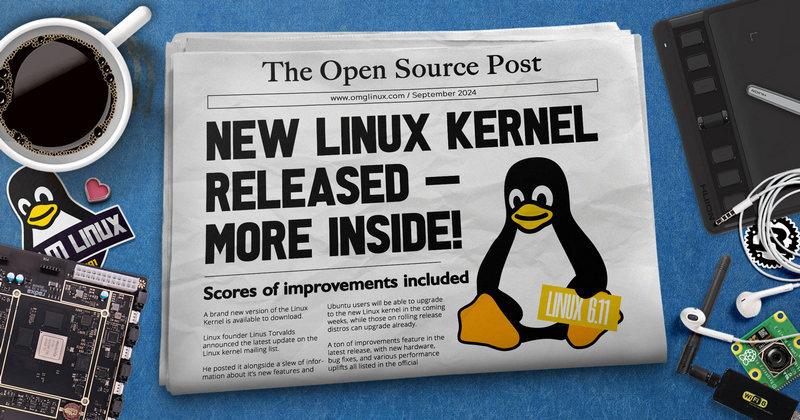 Linus Torvalds heeft versie 6.14 van de Linux Kernel vrijgegeven. De kernel is het hart van het besturingssysteem en zit, simpel gezegd, als laag tussen de hardware en de applicaties in. De nieuwe uitgave bevat de gebruikelijke hoeveelheid aan verbeteringen. Meer informatie kan bij 9to5Linux en OMG Ubuntu worden gevonden.
Linus Torvalds heeft versie 6.14 van de Linux Kernel vrijgegeven. De kernel is het hart van het besturingssysteem en zit, simpel gezegd, als laag tussen de hardware en de applicaties in. De nieuwe uitgave bevat de gebruikelijke hoeveelheid aan verbeteringen. Meer informatie kan bij 9to5Linux en OMG Ubuntu worden gevonden.
Linux 6.14 ReleasedHighlights of Linux 6.14 include Btrfs RAID1 read balancing support, a new ntsync subsystem for Win NT synchronization primitives to boost game emulation with Wine, uncached buffered I/O support, and a new accelerator driver for the AMD XDNA Ryzen AI NPUs (Neural Processing Units).
Also new is DRM panic support for the AMDGPU driver, reflink and reverse-mapping support for the XFS real-time device, Intel Clearwater Forest server support, support for SELinux extended permissions, FUSE support for io_uring, a new fsnotify file pre-access event type, and a new cgroup controller for device memory.
It also brings core energy counter support for AMD CPUs, power supply extensions to allow adding properties to a power supply device from a separate driver, support for T-Head vector extensions for RISC-V architectures, and power management suspend/resume support for Raspberry Pi devices.
Other new features in Linux kernel 6.14 include KVM hypercall service support for usermode VMM for LoongArch, a new PCI error recovery status mechanism for IBM System/390, SRSO_USER_KERNEL_NO support for AMD hardware, and manual fan control support on Dell XPS 9370 laptops.
On top of that, Linux 6.14 adds support for a greater range of MBQ access sizes and deferred read/write support for SoundWire devices, ACPI support for Rockchip SFC controllers, support for Atmel SAM7G5 QuadSPI and KEBA SPI controllers, and support for Blaize BLZP1600 and SpacemiT K1 SoCs.
Also new is support for restartable sequences on the OpenRISC architecture, support for amd-pstate preferred core rankings, SHA512 support for signing kernel modules, support for allocating and freeing “frozen” pages, a new zpdesc memory descriptor, and new BPF kfuncs for disabling and restoring CPU interrupts.
Further enhancements to ALSA rawmidi and sequencer APIs for MIDI 2.0 have also been added, along with a new feature that promises to significantly reduce the duration of system suspend and resume transitions on some machines, as well as lazy preemption support for the PowerPC architecture.
There’s also support for large folios for tmpfs, compress-offload API extensions for ASRC (Asynchronous Sample Rate Converter) support, support for restartable sequences for OpenRISC, NFSv4.2+ attribute delegation, dynamic NFSv4.1 session slot table resizing, and improved support for Snapdragon X CPUs.
Some interesting networking improvements in Linux kernel 6.14 include IPsec support for IP-TFS/AggFrag encapsulation allowing aggregation and fragmentation of the inner IP, support for jumbo data packet transmission in RxRPC sockets, and phylib support for in-band capabilities negotiation.
Furthermore, there’s support for configuring a header-data-split threshold (HDS) value via ethtool, a unified and structured interface for reporting PHY statistics, support for ipv4-mapped IPv6 address clients in smc-r v2, as well as netlink notifications for multicast IPv4 and IPv6 address changes.
Of course, there are many new and updated drivers for better hardware support including a new driver for the SM8750 platform, MT8188 Mali-G57 MC3 support in the Panfrost driver, support for the Nacon Evol-X and Nacon Pro Compact Xbox One controllers, a new EDAC driver for Loongson SoCs, support for the Intel Touch host controller, and PCI Wacom device support.
Linux 6.14 also adds support for the SteelSeries Arctis 9 wireless gaming headset, a new Intel CRPS185 power supply PMBus client driver, support for optional CPU fan on AMD 600 motherboards, support for the ASUS TUF GAMING X670E PLUS motherboard, support for the 8BitDo controller, and support for Intel Xeon “Clearwater Forest” processors.
The list continues with a new cpufreq driver for Airoha SoCs, port filtering support for NVIDIA’s NVLINK-C2C Coresight PMU, support for Nacon Evol-X Xbox One controllers, support for Marvell Odyssey DDR and LLC-TAD PMUs, support for Nacon Pro Compact controllers, and support for Allwinner suinv F1C100s.
Last but not least, Linux kernel 6.14 brings support for Awinc AW88083, Realtek ALC5682I-VE sound chips, Focusrite Scarlett 4th Gen 16i16, 18i16, and 18i20 interfaces, and an unofficial Xbox 360 wireless receiver clone. It also brings more Rust updates for building the kernel using only stable Rust features.


:strip_exif()/i/1274122604.png?f=thumbmedium)